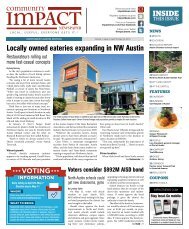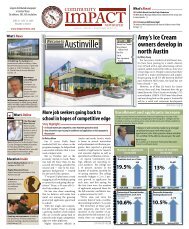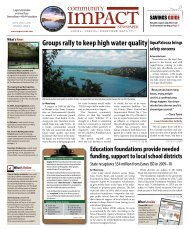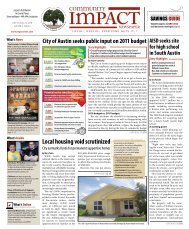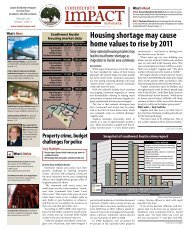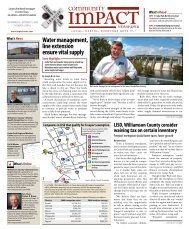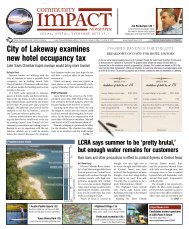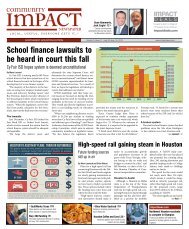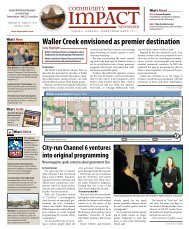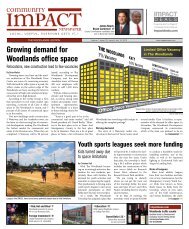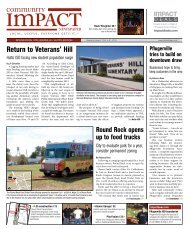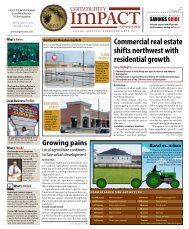Higher education programs receive funding, grants - Community ...
Higher education programs receive funding, grants - Community ...
Higher education programs receive funding, grants - Community ...
Create successful ePaper yourself
Turn your PDF publications into a flip-book with our unique Google optimized e-Paper software.
Grants<br />
EWCHEC<br />
CONTINUED FROM |1<br />
of its kind in Texas, said Laura Hobgood-<br />
Oster, chair of the Environmental Studies<br />
Program. Though other schools in Texas<br />
have environmental <strong>programs</strong>, she said<br />
the program is unique in its setup as an<br />
interdisciplinary study. Students in the<br />
program take classes relating to a multitude<br />
of disciplines, including religion,<br />
history, sociology, economics, anthropology<br />
and sciences.<br />
“Right now, we are the only program in<br />
Texas that is offering an environmental<br />
studies academic program that is integrated<br />
in terms of all these different approaches,”<br />
Hobgood-Oster said.<br />
She said the program has a visiting professor,<br />
but the school has been looking for a<br />
way to fund a full-time position.<br />
“We will be searching for somebody next<br />
year, and we are already playing around<br />
with the job description,” she said. “It will<br />
be someone with either a [doctorate] in<br />
environmental studies or environmental<br />
geography and does [Geographic Information<br />
Systems]. That is going to be part of the<br />
focus of the academic arm of this.”<br />
GIS is a mapping system that takes different<br />
kinds of data and layers it into digital<br />
maps. Grant money from the Kendeda<br />
Fund, which totaled $436,000, will be used<br />
to buy the equipment for the GIS lab and<br />
support sustainability projects on campus.<br />
Part of the grant money will also be used<br />
CONTINUED FROM |1<br />
Taylor ISD, Temple College at<br />
Taylor Foundation and Texas State<br />
Technical College.<br />
House Bill 2805, introduced<br />
this year by state Rep. Diana Maldonado,<br />
D-Round Rock, would<br />
require those partners to regularly<br />
Educational partners<br />
The East Williamson County <strong>Higher</strong> Education Center<br />
is a collaboration of Temple College at Taylor, Texas State<br />
Technical College, Texas Tech University, and Hutto and Taylor<br />
independent school districts.<br />
Students are enrolled at one of the partner schools and<br />
may attend classes at the EWCHEC campus. EWCHEC is the<br />
umbrella institution that houses the other schools and<br />
helps them work together, said Chuck McCarter, EWCHEC<br />
executive director.<br />
Students can attend Temple College classes at the Main<br />
Street building at 516 N. Main St., and high school students<br />
can also take advantage of free automotive mechanic classes<br />
at Taylor or Hutto high schools. Students in ninth through<br />
12th grade can also participate in the Legacy Early College<br />
High School program that allows student to earn up to 60<br />
college credit hours during all four years of high school.<br />
Courtesy Sledge Engineering<br />
East Williamson County <strong>Higher</strong> Education Center phase one rendering<br />
to fund a full-time staff coordinator who<br />
has strong skills in GIS, said Hobgood-<br />
Oster. The new faculty member should<br />
be hired in the fall and help in the staff<br />
coordinator search. Both positions would<br />
likely start in August 2010, she said.<br />
Other Mellon grant money will be used<br />
to create a Center for Social and Environmental<br />
Justice and create a Mellon Environmental<br />
Fellows Program.<br />
Students will be able to apply for $5,000<br />
through the fellows program to participate<br />
in study-abroad <strong>programs</strong> with a<br />
focus on environmental studies during<br />
their junior year.<br />
Upon their return the students apply<br />
the knowledge they gained while abroad,<br />
which could translate into local environmental<br />
projects that may benefit Georgetown<br />
and the surrounding area, Hobgood-Oster<br />
said. The program could also<br />
provide student leadership at the center.<br />
“[The fellows program] is tying together<br />
this idea of cultural and environmental<br />
studies — that you can’t really understand<br />
what is going on with environmental issues<br />
unless you understand the global impact<br />
of it,” she said. “The idea is that the students<br />
will bring these ideas from abroad<br />
back here, and also take ideas of things<br />
they learn here when they study abroad<br />
and those things will all play together.”<br />
Postdoctoral fellow<br />
A $129,000 grant from the Associated<br />
Colleges of the South will fund a postdoctoral<br />
fellow for two years.<br />
Jinelle Sperry accepted the position<br />
appropriate those funds annually.<br />
“EWCHEC is about providing<br />
quality <strong>education</strong>. It’s about having<br />
access to <strong>education</strong>. It’s about<br />
having affordable <strong>education</strong> as students<br />
transition to college,” Maldonado<br />
said. “The affordability of<br />
going to a major college or university<br />
is so daunting. Through this<br />
legislation, we will provide a road<br />
to success for students and families<br />
At the RETI<br />
State Rep. Diana Maldonado, D-Round Rock, the Taylor<br />
Economic Development Corporation and the East Williamson<br />
County <strong>Higher</strong> Education Center have established a<br />
Renewable Energy Training Institute. The $805,000 for the<br />
institute was included in the budget appropriations bill,<br />
Senate Bill 1, approved by legislators in May. At press time,<br />
the bill was awaiting the governor’s signature.<br />
The money could be used for training in solar and wind<br />
energy manufacturing and installation <strong>programs</strong> and other<br />
renewable-energy or green-collar job training <strong>programs</strong>,<br />
TEDC president Jason Ford said.<br />
U.S. Rep. John Carter initiated the plan.<br />
n<br />
79<br />
Map not to scale<br />
that are taking that first step of going<br />
into higher <strong>education</strong> or even<br />
being successful in high school.”<br />
Along with securing the annual<br />
appropriations, the bill also<br />
allows some partners to act as<br />
secondary securers.<br />
“We allowed the other entities<br />
to guarantee each other’s payments,”<br />
Nelson said. “Let’s say for<br />
some reason the banks wanted<br />
973<br />
2nd St.<br />
Carlos Parker Blvd.<br />
Student environmental activism<br />
impactnews.com June 2009 | 21<br />
Students at Southwestern can participate in the Students for<br />
Environmental Activism and Knowledge group, whose purpose is to<br />
encourage more environmentally sound practices and bring awareness<br />
to Southwestern, according to the school’s website.<br />
“One of the things that is so fun and also very challenging about<br />
environmental studies — and it is a lot like feminist studies in this way<br />
— is that the academic component almost necessarily means a kind<br />
of activist thing on campus,” said Laura Hobgood-Oster, chair of the<br />
Environmental Studies Program.<br />
SEAK is one of Southwestern’s largest student groups, she said. Last<br />
year some meetings drew up to 50 people.<br />
SEAK projects:<br />
Earth Day – Each semester, students promote activism on campus and provide information.<br />
Recycling initiatives – Recycling bins for paper, aluminum, plastic and glass are available in all<br />
academic, administrative and residential buildings.<br />
Green residence hall – Students who reside in the Dorothy Manning Lord Residential Center practice<br />
sustainable living. Hobgood-Oster said the group hopes to make all residence halls “green.”<br />
Earth Tub – Using approximately $10,000 from the Kendeda Grant, Southwestern will purchase an<br />
Earth Tub, a large bin to compost all of the school’s food waste.<br />
To-go boxes – Compostable to-go boxes instead of Styrofoam will be available in the dining hall. The<br />
new boxes will cost students 25 cents a piece in the first year. The cost will be absorbed into meal plan<br />
costs in 2010.<br />
with Southwestern and will begin teaching<br />
in the fall. Sperry, who completed her<br />
doctorate in conservation biology at the<br />
University of Illinois, will teach a course<br />
in biodiversity in the fall and may teach<br />
community ecology or conservation biology<br />
in the spring, Hobgood-Oster said.<br />
Sperry has spent time in Killeen researching<br />
the Texas rat snake and songbird<br />
nests.<br />
“Her research really looks at how<br />
predator and prey relationships happen,”<br />
S. Main St.<br />
95<br />
more security. [The bill] would<br />
allow the city to maybe make<br />
up the payment for the EDC or<br />
vice versa if for any reason any<br />
of those financial partners were<br />
not able to make their payment<br />
in any particular year.”<br />
After passing the senate, the bill<br />
will be brought to the governor’s<br />
office to be signed into law. If the<br />
bill is left unsigned by the governor,<br />
it will become law by the end<br />
of June, said Thomas Martinez,<br />
president of the Temple College<br />
at Taylor Foundation board.<br />
Once the bill becomes law, it<br />
could be August before the bonds<br />
are issued. Following that timeline,<br />
construction could begin<br />
and be completed by November<br />
2010 for a spring 2010 opening,<br />
he said.<br />
EWCHEC’s history<br />
The idea for EWCHEC began<br />
with Temple College at Taylor,<br />
which is the center’s primary partner,<br />
Nelson said.<br />
“EWCHEC is really an outgrowth<br />
of Temple College at Taylor,”<br />
he said. “TCAT started in<br />
1996. At that time we acquired<br />
an old vacant building that was<br />
30,000 sq. ft. The Temple College<br />
at Taylor Foundation and Temple<br />
Hobgood-Oster said. “She looks at snakes<br />
and birds more than anything else, and<br />
which snakes are eating which endangered<br />
birds and where they are doing that.<br />
It is really interesting research.”<br />
Her research has also included the effects<br />
of military equipment on animal habitats<br />
and how that affects the relationships between<br />
predators and their prey, she said.<br />
Comment and find related links at<br />
more.impactnews.com/4715<br />
College realized that what we<br />
were offering wasn’t satisfying all<br />
of the needs that were in the area.<br />
So Temple College invited Texas<br />
State Technical College to come<br />
in and begin offering technical<br />
courses in this area.”<br />
The legislature approved HB<br />
2074 in spring 2007, creating EW-<br />
CHEC; however, the bill created no<br />
<strong>funding</strong> mechanism for the center.<br />
In March, the TCAT building<br />
at 516 N. Main St. was renamed<br />
EWCHEC.<br />
Plans for EWCHEC’s campus<br />
include a 24,900 sq. ft. building<br />
at the intersection of FM 973 and<br />
Carlos Parker Boulevard on the<br />
south side of Taylor. The building<br />
could house a library, bookstore,<br />
administrative offices and<br />
classrooms.<br />
The second phase could include<br />
a building for Texas State Technical<br />
College, Martinez said. A timeline<br />
and <strong>funding</strong> for the second phase<br />
have not been determined.<br />
The campus would be located<br />
next to land purchased by the Taylor<br />
school district for its new high<br />
school facility.<br />
Comment and find related links at<br />
more.impactnews.com/4716



